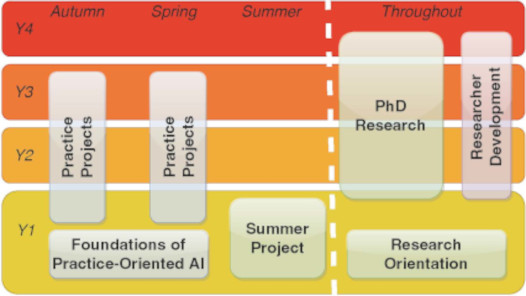Programme details
The mission of this programme is to deliver cohorts of highly-trained PhD graduates with the skills to design and implement complex interactive AI pipelines solving societally important problems. Our training programme has been designed from the ground up to train the next generation of research leaders who will address this challenge in innovative ways.
The PrO-AI training programme consists of a Foundation Year followed by three years of PhD study.
Practice projects offer ‘deep dives’ into a research domain. Students will liaise with domain experts to get an understanding of their expertise, expectations and success criteria. Exploring different domains will allow the students to acquire the transferable skills that will be key when moving between domains in their future careers.
The Foundations of Practice-Oriented AI module is run in a student-led, ‘flipped classroom’ manner and covers the main topics in data-driven AI, knowledge-intensive AI and human-AI interaction; human-centred and participatory methodologies to bring those AI techniques into practice; and the legal and ethical context that will help students to do so responsibly and in a manner beneficial to society. Academic mentors attend the sessions to gauge their mentee’s knowledge and identify areas where further study will be beneficial as part of the Research Orientation module, which completes a student’s foundational training in an individual-centred manner and guides them on the way to choosing a research topic for the Summer Project and subsequent PhD research.
After the foundation year, students will undertake a 3-year research project, supervised by one of the 100+ academics in the supervisory network and possibly in close collaboration with one or more external partners.
Throughout their programme the students participate in and build an online portfolio of transferable skills training inspired by the Vitae Researcher Development Framework. This includes training in responsible innovation, entrepreneurship, hosting visitors, organising events, public engagement, citizen science, etc.

